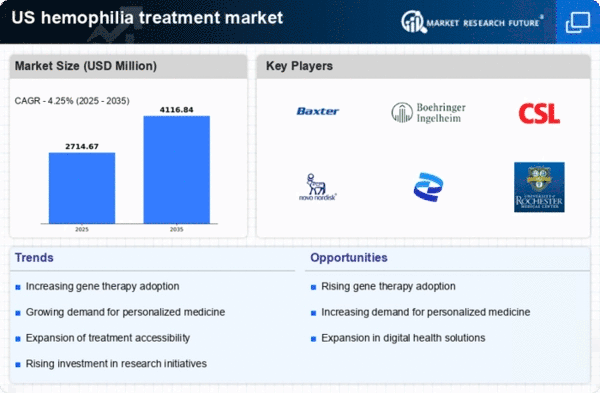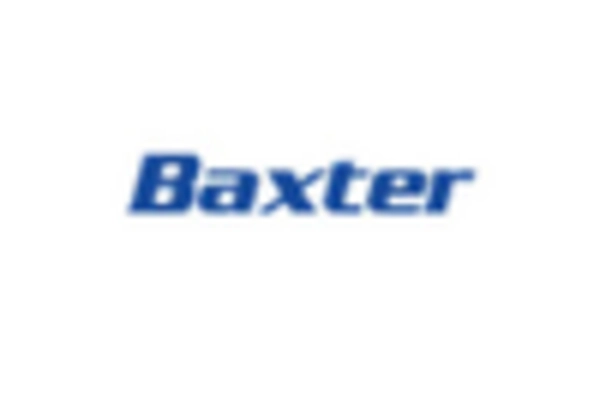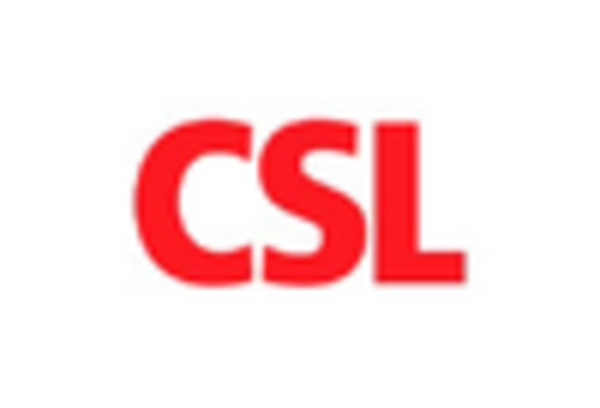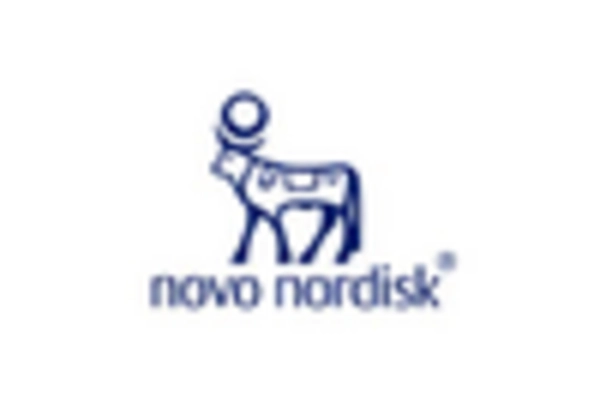Rising Prevalence of Hemophilia
The increasing prevalence of hemophilia in the US is a crucial driver for the hemophilia treatment market. Recent estimates suggest that approximately 20,000 individuals are living with hemophilia in the US, with a notable rise in diagnosed cases. This growing patient population necessitates the development and availability of effective treatment options. As awareness of hemophilia improves, more individuals are being diagnosed, which in turn drives demand for innovative therapies. The hemophilia treatment market is expected to expand as healthcare providers seek to offer comprehensive care to this population, including prophylactic treatments and on-demand therapies. Furthermore, the economic burden associated with hemophilia management, which can exceed $300,000 annually per patient, underscores the need for effective treatment solutions, thereby propelling market growth.
Advancements in Treatment Technologies
Technological advancements in treatment modalities are significantly influencing the hemophilia treatment market. Innovations such as extended half-life factor concentrates and non-factor therapies are transforming the landscape of hemophilia management. These advancements not only improve patient outcomes but also enhance the quality of life for individuals with hemophilia. For instance, extended half-life products allow for less frequent dosing, which is particularly beneficial for patients requiring prophylactic treatment. The hemophilia treatment market is likely to see increased investment in research and development as companies strive to bring novel therapies to market. The introduction of these advanced therapies is expected to capture a larger share of the market, as they offer improved efficacy and convenience compared to traditional treatments.
Increased Funding for Hemophilia Research
The surge in funding for hemophilia research is a pivotal driver for the hemophilia treatment market. Government and private sector investments are increasingly directed towards understanding the underlying mechanisms of hemophilia and developing new therapies. For example, the National Institutes of Health (NIH) has allocated substantial resources to hemophilia research, fostering innovation in treatment options. This influx of funding not only supports clinical trials but also encourages collaboration between academic institutions and pharmaceutical companies. As a result, the hemophilia treatment market is poised for growth, with a pipeline of promising therapies expected to emerge in the coming years. The commitment to advancing research is likely to lead to breakthroughs that could significantly alter the treatment landscape for hemophilia.
Growing Awareness and Education Initiatives
Growing awareness and education initiatives surrounding hemophilia are driving the hemophilia treatment market. Organizations dedicated to hemophilia advocacy are actively working to educate patients, families, and healthcare providers about the condition and its management. This increased awareness is crucial in promoting early diagnosis and treatment, which can lead to better health outcomes. Furthermore, educational programs are helping to dispel myths and misconceptions about hemophilia, thereby encouraging more individuals to seek treatment. As awareness continues to rise, the demand for effective therapies is likely to increase, further propelling the hemophilia treatment market. The emphasis on education is expected to foster a more informed patient population, ultimately leading to improved adherence to treatment regimens.
Regulatory Support for Innovative Therapies
Regulatory support for innovative therapies is a significant driver of the hemophilia treatment market. The US Food and Drug Administration (FDA) has implemented various initiatives aimed at expediting the approval process for new treatments, particularly those that address unmet medical needs. This supportive regulatory environment encourages pharmaceutical companies to invest in the development of novel therapies for hemophilia. The expedited approval pathways, such as Breakthrough Therapy Designation, facilitate faster access to potentially life-changing treatments for patients. As a result, the hemophilia treatment market is likely to experience a surge in new product launches, enhancing the therapeutic options available to patients. This regulatory landscape not only fosters innovation but also ensures that patients have timely access to the latest advancements in hemophilia care.
















